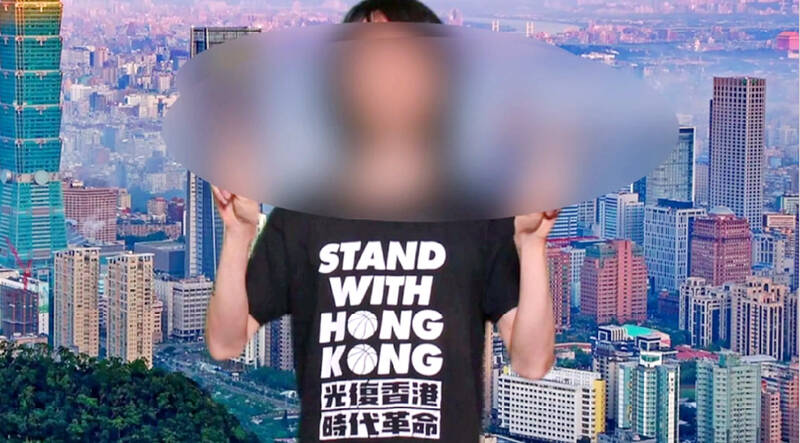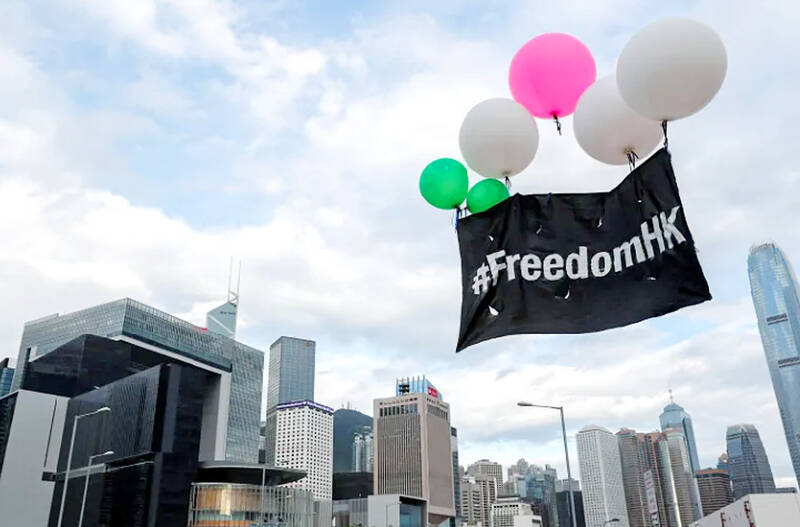A 27-year-old man faces up to several years in jail for sedition, after pleading guilty to wearing a protest T-shirt that prosecutors say flouts Hong Kong’s new national security law.
Chu Kai-pong (諸啟邦) had already served a three-month prison term for sedition in January for wearing and keeping in his luggage clothes and flags with protest slogans.
Yesterday, he pleaded guilty to one count of “doing acts with seditious intent,” leading to the territory’s first conviction under the new tougher law.

File photo: grab from FB
One of the slogans on the T-shirt, “Liberate Hong Kong, revolution of our times,” had been found to be “capable of inciting secession” in a separate court case.
Chu was arrested for wearing a T-shirt with the offending slogan and a yellow mask printed with “FDNOL” — the shorthand of another slogan “five demands, not one less” — on June 12 — a date associated with the huge and sometimes violent democracy protests in 2019.
Chu told police he believed the slogan called for the return of Hong Kong to British rule, the court heard, and he chose the outfit to remind the public of the 2019 protests when the phrase was widely used by pro-democracy demonstrators.

Photo: Reuters
Convicting Chu following his guilty plea, chief magistrate Victor So (蘇惠德) added that two other offenses of failing to produce an ID card and loitering were dropped.
Chu, who has been in custody for three months, is to be sentenced on Thursday.
Hong Kong enacted a tougher national security law in March, the second legislation of its kind following the one imposed by Beijing in the middle of 2020 afterb quashing the protests.
The revised law beefed up the offense of sedition — a colonial-era offense — to include inciting hatred of China’s communist leadership and upped its maximum jail sentence from two years to seven.
It also punishes five categories of crimes: treason, insurrection, sabotage, espionage and external interference.
Chu’s lawyer argued that the maximum he could be given would be two years. Sedition was created under British colonial rule, which ended in 1997, and was seldom used until Hong Kong authorities revived it in 2020 and charged more than 50 people and four companies.
Critics, including Western nations such as the US, say the new security law would further erode freedoms and silence dissent in Hong Kong.
However, authorities defended the law as necessary to fulfill a “constitutional responsibility,” comparing it to a “reliable lock to prevent someone from breaking into [our] home.”
As of last month, 301 people had been arrested under the two security laws, with 176 prosecuted and 157 convicted.
Additional reporting by Reuters

TRUST: The KMT said it respected the US’ timing and considerations, and hoped it would continue to honor its commitments to helping Taiwan bolster its defenses and deterrence US President Donald Trump is delaying a multibillion-dollar arms sale to Taiwan to ensure his visit to Beijing is successful, a New York Times report said. The weapons sales package has stalled in the US Department of State, the report said, citing US officials it did not identify. The White House has told agencies not to push forward ahead of Trump’s meeting with Chinese President Xi Jinping (習近平), it said. The two last month held a phone call to discuss trade and geopolitical flashpoints ahead of the summit. Xi raised the Taiwan issue and urged the US to handle arms sales to

A magnitude 5.6 earthquake struck off the coast of Yilan County at 12:37pm today, with clear shaking felt across much of northern Taiwan. There were no immediate reports of damage. The epicenter of the quake was 16.9km east-southeast of Yilan County Hall offshore at a depth of 66.8km, Central Weather Administration (CWA) data showed. The maximum intensity registered at a 4 in Yilan County’s Nanao Township (南澳) on Taiwan’s seven-tier scale. Other parts of Yilan, as well as certain areas of Hualien County, Taipei, New Taipei City, Taoyuan, Hsinchu County, Taichung and Miaoli County, recorded intensities of 3. Residents of Yilan County and Taipei received

Taiwan has secured another breakthrough in fruit exports, with jujubes, dragon fruit and lychees approved for shipment to the EU, the Ministry of Agriculture said yesterday. The Animal and Plant Health Inspection Agency on Thursday received formal notification of the approval from the EU, the ministry said, adding that the decision was expected to expand Taiwanese fruit producers’ access to high-end European markets. Taiwan exported 126 tonnes of lychees last year, valued at US$1.48 million, with Japan accounting for 102 tonnes. Other export destinations included New Zealand, Hong Kong, the US and Australia, ministry data showed. Jujube exports totaled 103 tonnes, valued at

BIG SPENDERS: Foreign investors bought the most Taiwan equities since 2005, signaling confidence that an AI boom would continue to benefit chipmakers Taiwan Semiconductor Manufacturing Co’s (TSMC, 台積電) market capitalization swelled to US$2 trillion for the first time following a 4.25 percent rally in its American depositary receipts (ADR) overnight, putting the world’s biggest contract chipmaker sixth on the list of the world’s biggest companies by market capitalization, just behind Amazon.com Inc. The site CompaniesMarketcap.com ranked TSMC ahead of Saudi Aramco and Meta Platforms Inc. The Taiwanese company’s ADRs on Tuesday surged to US$385.75 on the New York Stock Exchange, as strong demand for artificial intelligence (AI) applications led to chip supply constraints and boost revenue growth to record-breaking levels. Each TSMC ADR represents